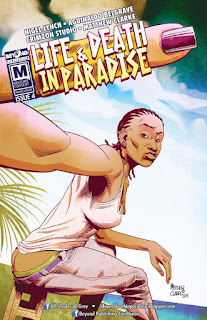One of the issues/concerns that gets bandied about in comics these days is, of course, that publishers aren't doing enough to support women and minorities. They're not hiring enough creators or featuring enough characters outside of a white cishetero male pool, relative to the population. And while there are some extremely talented individuals out there, who happen to be women and minorities, that they're producing and publishing their own works can make it difficult to even find, much less support them. Turtel Onli, for example, has been publishing his own Afrocentric comics for over 30 years, but you'd be hard-pressed to find them in a comic shop outside of his hometown of Chicago.
Now, most comic shops are happy to order books for you that they wouldn't normally stock, but this still generally requires that they work with publishers and distributors. They're going to call up their local distribution rep, and ask for your book and if it isn't available through a known publisher, they're mostly likely going to shrug and say they can't get it. Generally, if you see self-published comics in a local shop, it's because the creator was physically in that shop at some point and handed them her or his comics to sell.
So how can you add diversity to your pull list if the big American publishers aren't producing much?
The key is in that question itself. Whether you're consciously thinking of this or not when you're talking "comic publishers" or the "comics industry", you're most likely limiting your thinking to American publishers of American materials. That's not completely unreasonable, given that you're in America and want to read comics in your native language. But if you're looking for diversification, why not look at a more diverse base in the first place? We're not the only country that speaks English, after all.
Gestalt Comics, for example, is out of Australia. Campfire is out of India. JR*Comics is out of Korea. Beyond Publishing is out of Barbados. And they're all publishing in English.
Admittedly, I can't say whether their complete lines are all top-notch; I've only read one or two books from each of them. But the point is that you, as a reader, don't have to limit yourself to American publishers. I don't know the full extent to which non-US publishers utilize people other than white cishetero men as their creative talent, but they're largely using local talent. So a comic out of Egypt would likely be created mostly by Egyptians, a comic out of Brazil would like be created mostly by Brazilians, a comic out of Zimbabwe would likely be created mostly by Zimbabweans. That will inherently make the make-up of creators you read more diverse. And isn't that what we're trying to get to?
On -isms: Diversifying Your Pull List
By Sean Kleefeld | Thursday, September 03, 2015
Leave a Comment







0 comments:
Post a Comment